The initiatives of companies participating in the Ministry of Economy, Trade and Industry’s demonstration project “Future Classrooms” will be introduced on the EDU-Port Japan website. This article was contributed by the Institution for a Global Society (IGS).
It contains a detailed explanation of the features of Ai GROW, a non-cognitive ability evaluationtool provided by IGS to educational institutions, and the benefits of its introduction in educational settings.
How do you find out what your strengths are?
IGS is an EdTech/HRTech company that provides tools which allow everyone, from children to working adults, to visualize their strengths, especially non-cognitive abilities which are important for successful social activities, through 360-degree evaluation.
Schools in Japan actively incorporate collaborative learning into many situations. Students learn while interacting with each other. Ai GROW, an evaluation tool we provide to educational institutions achieves more objective evaluation of students’ abilities, including non-cognitive abilities, by incorporating not only self-evaluation, but also peer evaluations from friends. By being evaluated by friends who know what they show in their interactions with each other, students are able to grasp strengths they were not aware they had.
However, in peer evaluations, the influence of various biases, such as lenient or harsh evaluations, is inevitable. This is especially true for minors who are still at the developmental stage. Ai GROW, therefore, uses AI to analyze and correct the biases and deviations in such evaluations. Eliminating biases as far as possible enables achievement of evaluations of maximum objectivity.
Students receive a personal report. This is positive feedback that primarily focuses on their strengths and contributes to improving their self-esteem. Furthermore, knowing the difference between their own and their friends’ evaluations helps to improve their metacognitive skills.
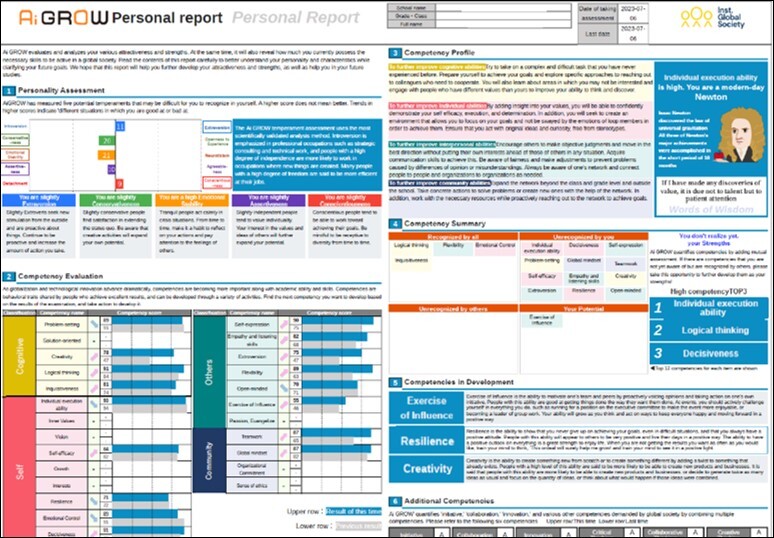
▲A i GROW personal report for positive feedback
In addition to quantitative evaluations, teachers also make qualitative evaluations of students each semester. Until now, teachers have managed to conduct these evaluations through hard work and experience, but with calls for workstyle reform as well as teachers’ other wide-ranging duties, it is not realistic to expect teachers to spend time evaluating the individual capabilities and growth of a large number of students. Ai GROW is now an indispensable tool for smooth school management, as it minimizes the time and effort required of teachers, while at the same time allowing them to conduct multifaceted evaluations of a large number of students through a greater number of eyes in daily school life.
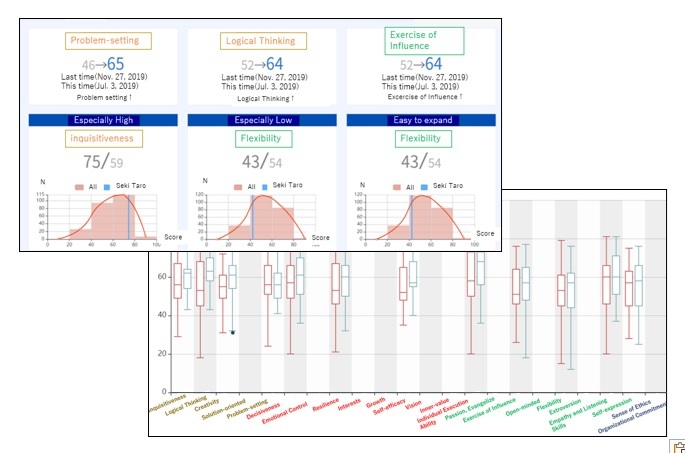
▲ Student data displayed on the Ai GROW Management portal

▲ The “findings proposal” suggests findings according to particularly high qualifications and capabilities
Once the issues have been highlighted by the evaluation, goals can be set. In addition to the evaluation tools, we also offer “GROW Academy,” video content that allows students to learn frameworks for solving problems from a single class session, depending on the skills they want to develop and the class situation. We also offer an entrepreneurial simulation program in which students learn these frameworks and data analysis to take on the challenge of solving problems that have no answers, such as the realization of a green society, as entrepreneurs. These frameworks are important concepts to acquire in order to tackle a wide range of issues. By not only watching and learning, but also using the included instructional plans and worksheets, these frameworks will become “real-life skills” that can be utilized in the real world.
The spirit of cooperation and sensibility fostered by Japanese education are gaining recognition around the world. The benefits of Japan’s unique education, such as organized activities like group learning in PE and music education, are attracting attention. However, the cooperativeness, sensibility, and creativity fostered through such activities have been difficult to visualize. By incorporating evaluation tools like Ai GROW, we will be able to identify the effectiveness of educational activities in an evidence-based manner while focusing on the strengths of each student and understand “what kind of activities develop what kind of skills”.
In fact, the more objective evaluation mechanism of our Ai GROW and the visualization of the educational effects it brings have been attracting attention recently, and we are receiving an increasing number of requests to utilize it in overseas expansion. In particular, being able to visualize the strengths of each student and the changes they have undergone, and being able to verify the results of the program on an evidence basis and link them to the next program is a great advantage, especially in foreign countries where classes are often held with large numbers of students. In recent years, not only the introduction of tools in such overseas expansion programs, but also plans for joint research using the tools are progressing. Recently, We were invited to attend the Asian Development Bank’s 10th ADB International Skills Forum: A New Era of Digitalized and Climate Resilient Human and Social Development where we had the opportunity to attend a talk session, presentations and a classroom demonstration by the teacher from the Ai GROW adopting school, which attracted a great deal of interest.
-
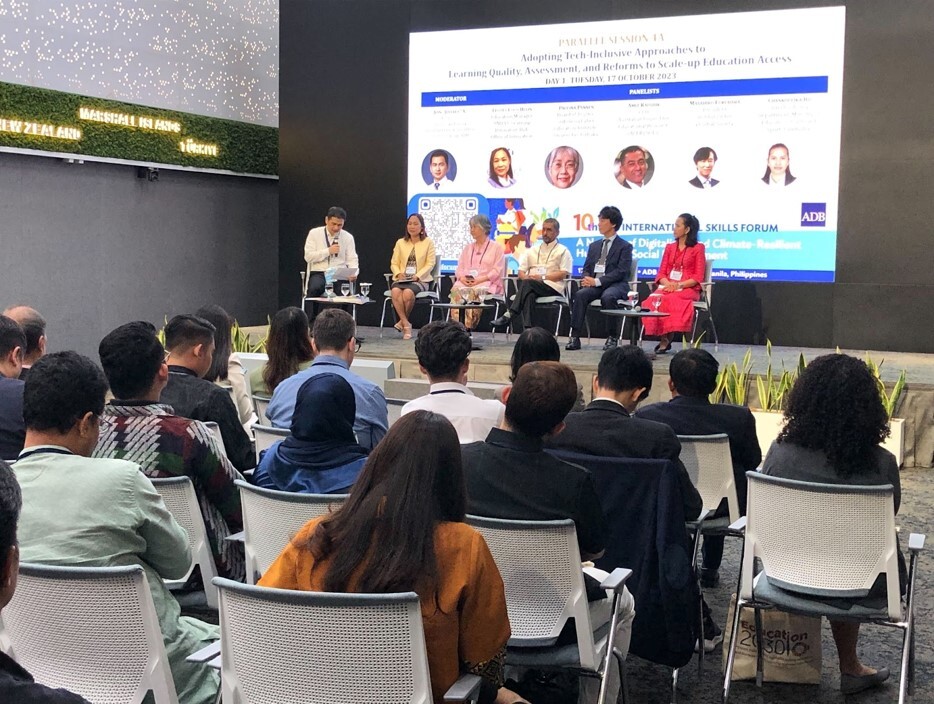 Invited to a talk session at the ADB International Skills Forum (2023)
Invited to a talk session at the ADB International Skills Forum (2023) -
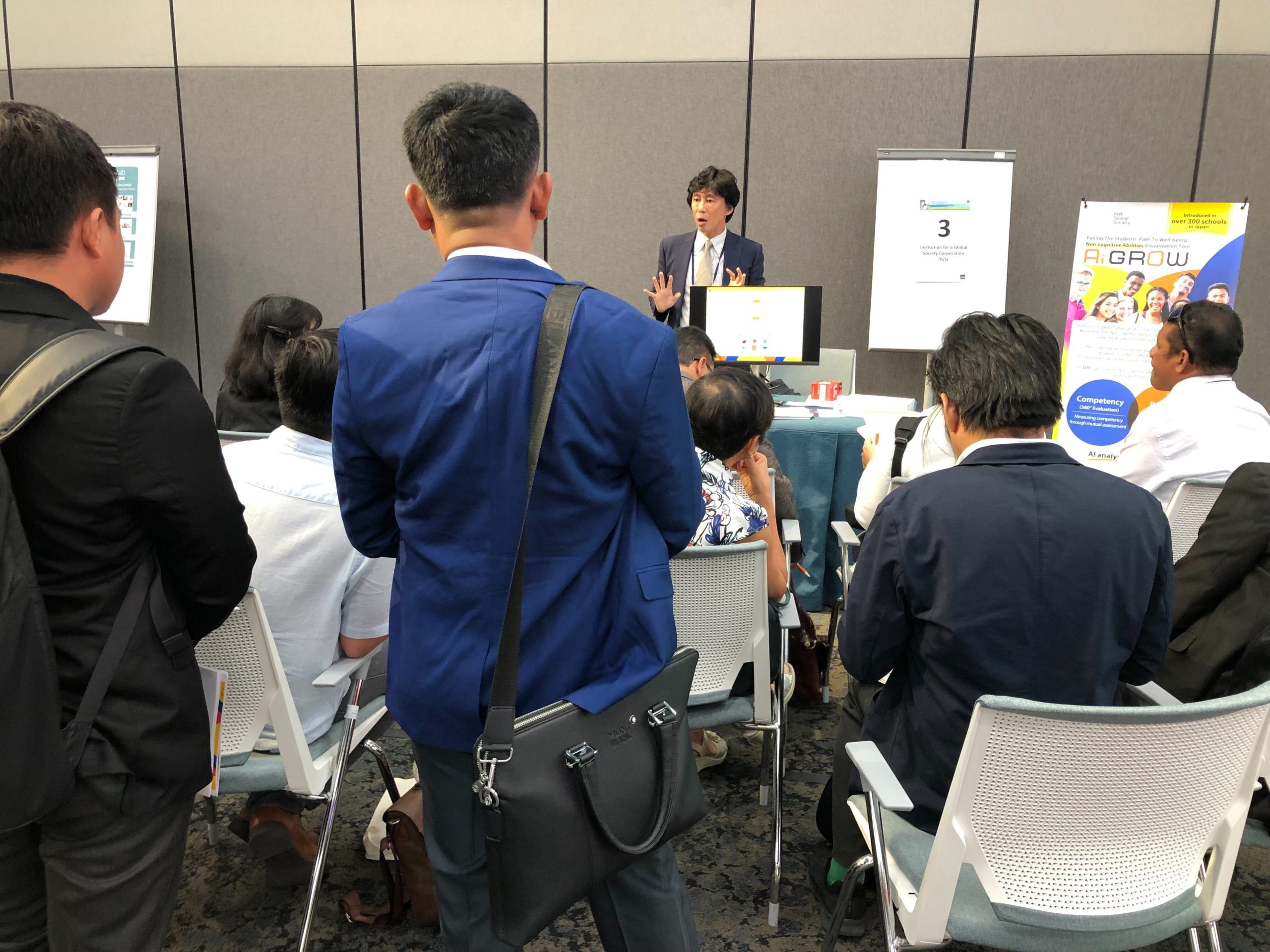 Presentation at the ADB International Skills Forum (2023)
Presentation at the ADB International Skills Forum (2023) -
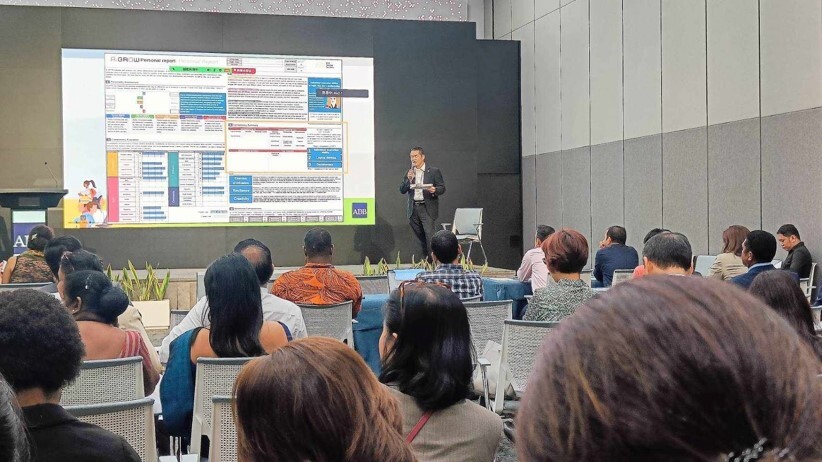 Classroom demonstration at the ADB International Skills Forum(2023)by the teacher from the Ai GROW adopting school
Classroom demonstration at the ADB International Skills Forum(2023)by the teacher from the Ai GROW adopting school
Furthermore, our evaluation system has been used in a case at Harvard Business School, and we believe that our use of AI not as a black box, but as a means to eliminate evaluation bias and achieve better evaluations, has attracted much attention.
-
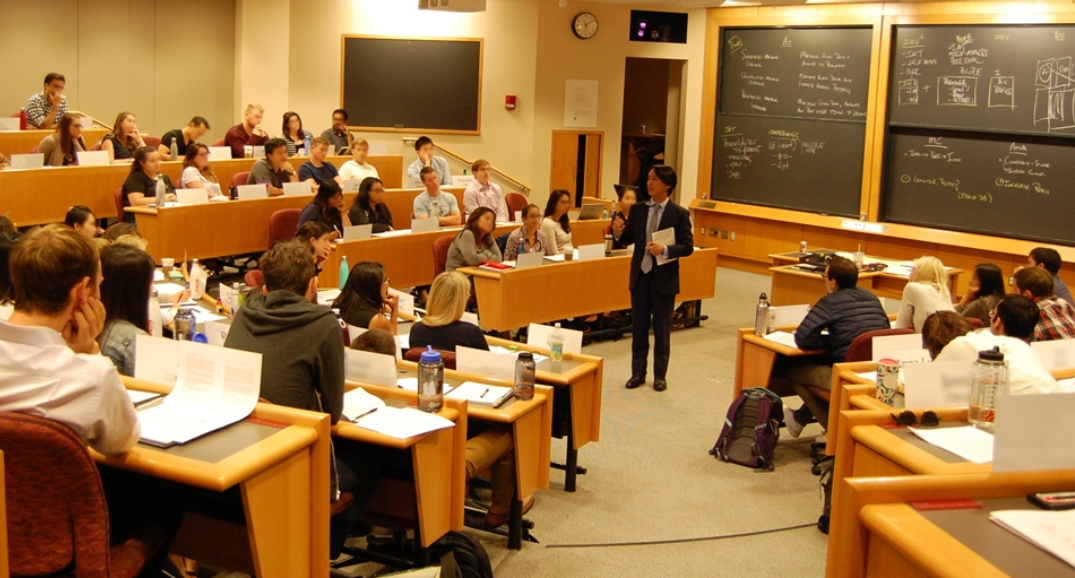 My lecture at Harvard Business School
My lecture at Harvard Business School
We believe that the power of Japanese education has the potential to spread to many more countries. Ai GROW” can be a support tool for bringing Japanese education to more countries by clarifying its educational benefits and enabling individualized support for large classes, which is one of the challenges in many countries overseas. We hope that Japanese education and our tools will help support the growth and happiness of as many children in the world as possible. Our challenge has only just begun.







